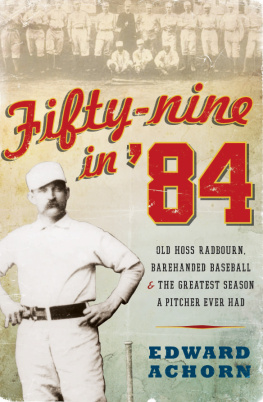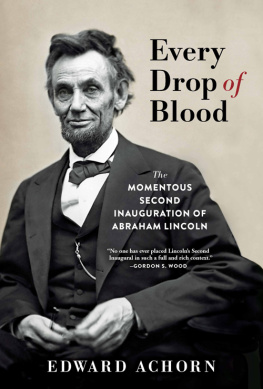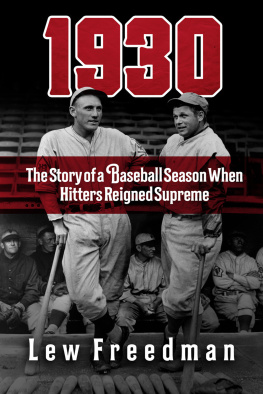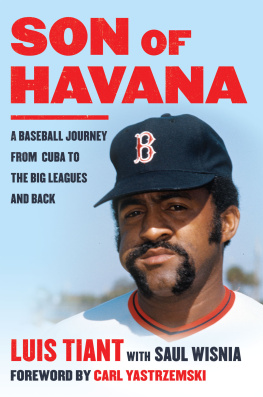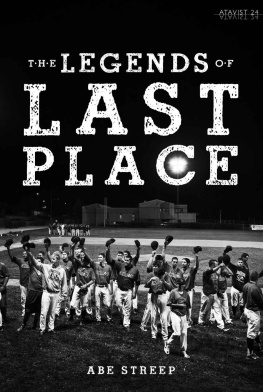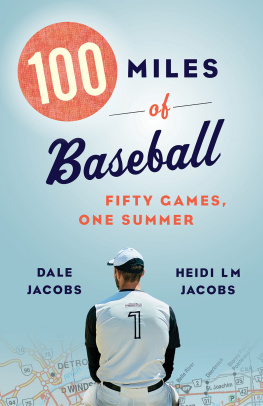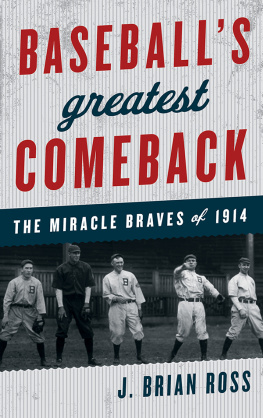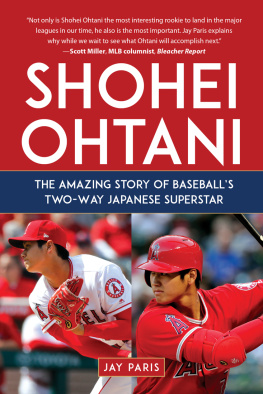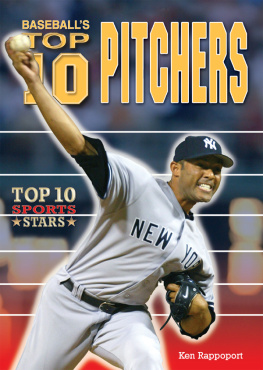To Valerie
I see, writes a correspondent, that some fan picks [Christy] Mathewson, [Ed] Walsh and [Rube] Waddell as the three greatest [pitchers]. Matty was a marvel. But when you come to the greatest, it is a matter of choice between Radbourne and [Walter] Johnson. Radbourne, I think, was the greatest pitcher I ever saw.
Grantland Rice, syndicated columnist, 1924
To this day, I dont think I have seen better pitchers than were Radbourne and Sweeney of the old Providence team, with, perhaps one exception. That was Christy Mathewson. He, I think, would have compared with either of the first two. But they were wonders, and [neither] Mathewson nor any other pitcher who has come since was better than they.
Frank Bancroft, former manager, 1920
He was brainy and game to the core; he had curves that were as baffling as any sent plateward. He had a fastball that was a marvel; a slow ball that was about as deceptive as any I have ever seen thrown. And, best of all, Radbourne had control that was absolutely marvelous. He practiced weeks, months and even years to acquire perfect handling of the baseball, and when he finally decided that he had learned his lesson he was able to place the ball in almost any spot that he willed.
Clark Griffith, star pitcher, 1919
He will go down in the history of the game as by far the best pitcher of his day, and his wonderful stamina and record of pitching consecutive games will never be approached, much less equaled.
Sam Crane, former manager, 1912
Volumes have been written about Pitcher Charlie Radbourne. But why should that prevent me from singing the praises of the gamest man who ever stepped into the box? There is no doubt that Radbourne was as great a little man as ever wore a uniform.
Hardie Richardson, former player, 1911
Radbourns wonderful work [in 1884] was, toward the last, the result of grit, pure and simple.
Wilkes-Barre Times-Leader , January 10, 1911
Each year hundreds of pitchers claim attention of the world; and each year they are promptly forgotten. But Illinois produced a man who, although now 11 years deceased, has a brighter name than any of the multitude.
Jacob Morse, reporter, 1908
He had a disposition that no one like him possessed and a will power that no one could swerve. I have seen him cry at one time with madness, and yet one kind word from anyone he liked would make him go the limit for that person.
Ted Sullivan, former manager, 1905
Radbourne was a man of iron nerve, indomitable pluck and great courage. He was also a close student of baseball and a scientific player. He was not a marvel in point of strength, but he had a head filled with gray matter which he never failed to use.
Rochester Democrat and Chronicle , January 2, 1905
For dead gameness and grit he never had an equal. His heart was as big as ever was encased in human flesh and as tender as a childs. He was obstinate and morose to deceitful people, but one kind word from a friend that he liked and he would wade in blood for him. This was Charles Radbourn, the king of pitchers.
Ted Sullivan, former manager, 1897
Rad was indisputably the greatest base ball pitcher the world has ever known.
Sporting News , March 6, 1897
Radbourn was an eccentric fellow in some respects, and one who had to be handled with gloves.
Providence Journal , February 6, 1897
Rad is a peculiar fellow personally. He is called a crank by many, but at the same time these very ones admit he is a thorough good fellow. This statement, though apparently paradoxical, is quite true. With managers and umpires he is seldom able to get along. Possibly this is due to the fact that his own estimation of his value and importance is not always shared by them, for it must be admitted that Charles Radbourn sometimes is afflicted with what is known in common language as a swelled head. However, all this does not detract from his ability as a pitcher, for when he does let himself out there is some excuse for his vanity.
Quincy Daily Herald , May 11, 1890
He is a curious fellow, and to get along with him it is necessary to coax a bit like one would a great big boy. Rad is certainly worth being coaxed.
Boston Globe , April 15, 1888
Every fair-minded man is obliged to admit that Radbourne is the greatest pitcher in the world.
Evening Telegram , Providence, September 1, 1884
Radbourn is the paragon of the season, and a standing wonder of the profession.
Cleveland Herald , September 16, 1884
Radbourn pitches ball as if his very life depended upon it.
Cleveland Leader , September 16, 1884
Contents
I n 1916, a baseball writer named Brown Holmes polled ten famous major-league managers, asking them to choose the greatest feat in the games history. This was before Joe DiMaggios 56-game hitting streak, or Babe Ruths 60 home runs in one season, or Carl Hubbells striking out five future Hall of Fame hitters in a row in an All-Star game. Still, there were many wonderful feats to choose from, even then: Tip ONeills .492 batting average, Harry Stoveys 156 stolen bases in a single season, Wee Willie Keelers 44-game hitting streak, Rube Marquards 19-game winning streak, Ty Cobbs amazing run of batting titles, Walter Johnsons 56 scoreless innings in a row.
When it came time to cast their votes, however, six of the ten managers, including some of the keenest minds in the gameJohn McGraw, Connie Mack, Pat Moran, Clark Griffith, Jimmy Callahan, and Hugh Jenningspicked another effort as the greatest feat in baseball. They voted for Charles Old Hoss Radbourns astonishing performance in 1884. No other triumph came close in the polling, and for good reason: no pitcher has ever won as many games in a season, and none ever will. And the way Radbourn did it, pitching virtually alone, day after day, in the teeth of agonizing pain, had become the stuff of baseball legend.
The managers of the early twentieth century certainly understood that Radbourns achievement was extraordinary, almost unbelievable. In the years since, though, Radbourns story has faded into the mist. Radbourns plaque remains in the Baseball Hall of Fame, but modern statisticians have tended to downplay his accomplishment, noting that many men of his era pitched plenty of innings and won piles of games. He is hardly a household name, even among fans who know some baseball history. Part of that was Radbourns own fault. A sullen man, he did little talking to strangers, letting his career tell its own story. When he left the game, he wrote no books or magazine articles about his experience; indeed, when inquisitive fans asked him about his storied career, he mumbled a few words and left it at that. He was such an enigma that no one even could be sure of how to spell his name, both during his own times and for well into the next century. Many went with Radbourn , the accepted spelling today, but just as many went with Radbourne , with an e . He never made clear which was correct. (For the sake of consistency, this book will use Radbourn, except in quotes.)
I learned about Radbourn while growing up in Westborough, Massachusetts, a small town outside the deteriorating industrial city of Worcester. At some point I came across the odd fact that Worcester, of all places, once had a team in the National League the National League. What kind of game could baseball have been in those days? I wondered, and I have spent a lifetime reading books, scouring statistics, and squinting at microfilm trying to figure it out. The first edition of MacMillans The Baseball Encyclopedia , published in 1969, when I was twelve, opened my eyes to the rosters and stats of this vanished time, and on page 104 I found the most extraordinary numbers of allthe 1884 season of O. Radbourn, the books shorthand for Old Hoss Radbourn. (What a name!) I had to know who this man was, how he could win so many games, what made him tick. When my journalism career took me to Providence, where he had played well over a century earlier, it was as if fate was opening a door.

